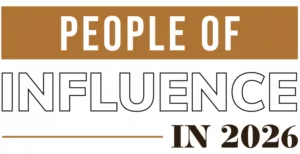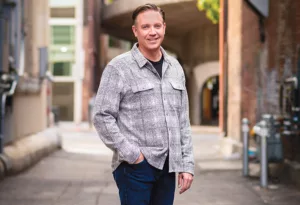
Ukrainian Closet looks to expand in third year in North Spokane
Nonprofit leader reflects on overcoming challenges, vision for future of organization
_web.webp?t=1722496505&width=791)
Zhanna Oberemok founded Ukrainian Closet three years ago after realizing the ongoing need for basic necessities among Eastern European refugees arriving in the Spokane area.
| Erica BullockSpokane-based nonprofit Ukrainian Closet is developing expanded programming and creating a path for more inclusion in its third year of operation, despite consecutive setbacks that have impacted the supply of resources for refugees, says founder Zhanna Oberemok.
Oberemok also owns Spokane Valley-based Roller Valley Operations LLC, where she began her mission to help refugees arriving from Ukraine after the onset of the war with Russia.
Before officially establishing Ukranian Closet though, Oberemok says she thought the help she could provide these refugees arriving in Spokane would only be needed a short time.
"We just signed a third lease for a project that I thought was going to be a couple months," Oberemok says.
The longevity of the nonprofit was unintentional, but the need was apparent and continues to motivate Oberemok to sustain the organization, she says.
The Slavic community in Spokane has grown to about 60,000 people, she says.
"We've served over 3,000 families," Oberemok asserts.
Between five and 10 families currently visit Ukrainian Closet daily, she says, adding that demand has declined from a high of about 40 families served a day.
Ukrainian Closet operates in partnership with the Spokane Slavic Association, a social and cultural services organization formed in 2021 to provide resources and information for refugees and immigrants arriving in Spokane from Ukraine and other Eastern European countries.
The association and Ukrainian Closet both help people and families find basic necessities, health care, financial and tax consulting, legal advice, housing and resettlement assistance, employment assistance, and educational programs.
Both organizations operate at the Ukrainian Closet store, at 9431 N. Division, in the Heritage Square shopping center in North Spokane.
Ukrainian Closet and Spokane Slavic Association together have three board members.
The store is run with six volunteers who are in workforce training paid by Career Path Services - Employment & Training, of Spokane, Obemerok explains.
"They provide the volunteers to me. ... I think that's what has helped sustain this project," she says. "I get to have these people here at the store opening it, closing it, cleaning it, sorting it, and then they get reimbursed for their efforts through the nonprofit. If it wasn't for that, I have no idea how I would get people to run this place."
Ukrainian Closet's 2023 annual budget was $130,000, and the organization collected over $30,000 in monetary donations last year, she says.
Ukrainian Closet accepts donations of clothes, vehicles, furniture, and other household items that are in good condition, and is especially in need of daily-wear shoes. Donated goods are provided at no charge for people requesting assistance.
Prior to launching Ukrainian Closet in 2022, Oberemok says she was using her platform as owner of Roller Valley to advocate for more resources for refugees and to store donated goods at the facility.
"I realized that my wallet wasn't bottomless, so we started gathering donations at the roller rink," she explains. "When people would come roller skating, they would have to go past mattresses, pots, pans. ... We were packed with furniture. At one point, in front of the roller rink, we had probably 12 sets of couches. That's when I said, 'OK, we need a place.'"
A 53-foot trailer was purchased with help from her husband Tim and his Spokane-based, family-owned trucking company, TDR Logistics LLC, to keep items secure from the weather. However, Oberemok and volunteers couldn't keep up with donations, so they also brought in a storage container.
"I started looking around everywhere for a place ... but I couldn't find anything," she recalls. "I was getting really discouraged because I know the Valley has a lot of empty spaces where we could just be a hub of these items for a few months."
Her requirements for a dedicated donation site were to have frontage on a main road that would allow for one-year lease terms and cost under $2,000 monthly, she says.
"I was prepared to have my business carry the costs as a charity for the time I'm doing this, but it had to be under $2,000 or else I wouldn't be able to afford it."
As a last resort to find a new space, Oberemok turned to a friend for help who connected her with a landlord willing to lease under her conditions.
"The first year was full of these miracles," she says. "As long as we would speak the need, it somehow made its way to us. The one thing I was missing now was a nonprofit."
Organizing a nonprofit through one of the 20 Slavic churches wouldn't work, she explains, because the ministries needed to remain neutral in the Slavic community, which is comprised of people from many Eastern European and Western Asian countries including Russia, Moldova, Poland, Kyrgyzstan, Ukraine, and others.
It turns out that the friend who helped her find a leasable space also took initiative a year prior to register a nonprofit, Spokane Slavic Association, in anticipation of establishing a future community organization.
"I became the executive director of Spokane Slavic Association by a dream that somehow manifested before I even knew that I was going to need it," Oberemok says. "The amount of tears we've seen here, the amount of stories we've heard, the amount of first impressions we've listened to, the cultural shock stories ... it was just miracle after miracle happening, and things were aligning, and we had such a sense of community."
Ukrainian Closet and the Spokane Slavic Association have expanded programming to include a learn-and-play program for children up to 5 years old, and a science, technology, engineering, and math program for kids 5 to 11 years old.
The association also has recently published a 70-page welcome guide with information about how immigrants and refugees can connect with federal and public agencies, utility providers, housing, health care, and a list of discounted recreational opportunities.
Additionally, the association now hosts popular business workshops for entrepreneurs, she says.
"What we're learning, is that the interest is there," says Oberemok. "The Ukrainian people are coming with the head on their shoulders for business in this land of opportunity."
The workshops offer expert guidance to entrepreneurs regarding business license registration, filing taxes for a business, available software for business accounting, and insurance basics.
"The business workshops are working really well and now we are also working on an active business directory on our website. If you want to know about a Slavic-owned business, our website will have its business, directions, and website connected," she says.
The goal is to use the business directory to serve as a bridge to connect with immigrants and refugees who aren't receiving support or services through a church.
"We have 60,000 people in town. Only 20,000 are connected with the churches," she says. "Where's the other 40,000? How do we connect with them?"
For new arrivals who aren't affiliated with a religion, people are "fighting upstream, asking questions everybody else already knows the answers to," Oberemok says.
Her vision for the future of the organization includes child care and community centers, she says.
"We're looking at a Slavic Early Learning Center and then a Slavic Community Center focused on Eastern European culture," she says.
The plans are in the early stages of development, however Oberemok intends to provide a culturally sensitive day care that will incorporate Slavic food, community, and a sense of identity.
"The number one fear that most families have when they immigrate is that we're going to lose our identity," she says. "My goal is to have a center that can be state funded, state of the art, and professional ... where we talk about the cultures, the differences, the integration from one world into the other and make it so smooth that families don't have a traumatic experience."
The idea for an early learning center prompted a long-term vision for a cultural community center where Slavic dances, art, and languages can be learned and celebrated.
"There's a lot of great things that people are doing already in town," she says referring to a recent visit to the Northeast Community Center. "I feel I can contribute to filling in the gap of that cultural aspect."
Oberemok says she's grateful for the generosity she's seen in the Spokane community.
"What I saw in this two-year journey is just mind blowing. (Ukrainian refugees are) not used to seeing such love, generosity, and compassion, and the American people have been teaching the Ukrainian people about the big heart they have," she says. "Sometimes I come back and look at my vision board and I'm (surprised) it's happening. We're here in our third year. We've expanded now, and I'm going to run this nonprofit how I do my business, 100% all in."



_web.webp?t=1764835652)
